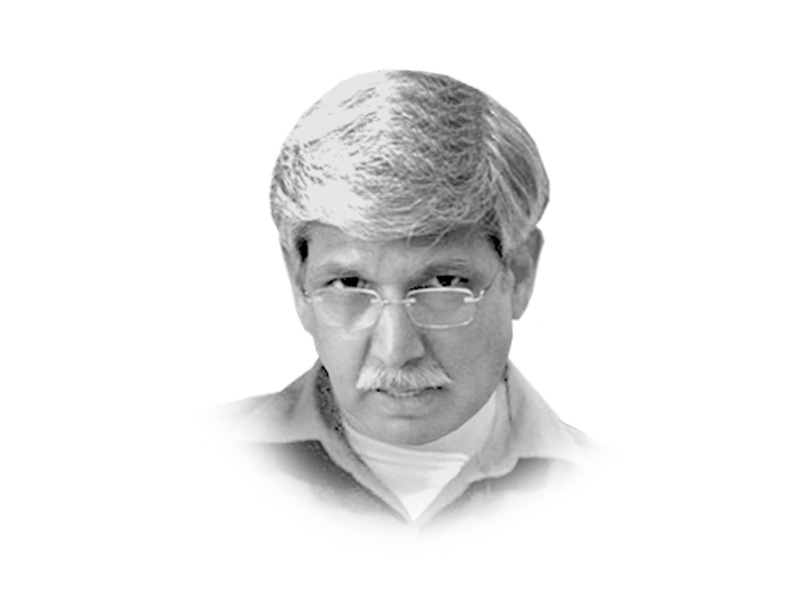
Asif Zardari has survived. Given his, by now famous quip, “maulay noon Maula na maray te maula nahin marda”, is a sad reflection of someone consumed by a singular fear of being eliminated by one of the numerous enemies perceived by him. This fear practically paralysed him into inaction and gave him that fortress mentality that never let him truly venture beyond the safety of his four presidential walls. Being concurrently both the administrative and operational head of his party, the functioning of the PPP government suffered inexorably since the mind leading it seemed numbed into stagnation.
There were bright spots nonetheless, in particular, resurrecting the 1973 Constitution to as close to its intended character as possible, though the credit must also be given to other parties and to Raza Rabbani, as well. That too much was expected of Raza Rabbani, when he was also made to head the Parliamentary Committee on National Security (PCNS), became apparent when the recommendations by the committee failed to find resonance within the government itself, while being seen as overzealously interventionist in government affairs. Neither did any good to the image of the PPP in power and to the PPP as a political player.
Foreign policy under the PPP found traction later in the party’s tenure and much credit for that rests with the confidence that the young foreign minister in Hina Rabbani Khar seemed to exude. She proved to be a no-nonsense foreign minister and remains the hope for a resurrected PPP to fall back on. It is sad that given the moribund nature of our politics, Mian Nawaz Sharif cannot call on her to fill in when the PML-N is desperately short of talent in the area of foreign policy. A thought, worthy of consideration.
The last five years established a consummate politician in Asif Zardari’s person. To his credit, not only did his government complete five years, he did too. There were challenges galore to his personal character and integrity, and barbs, but he bore them all with characteristic grace without ever flinching to react impulsively or by resorting to petty vendetta. He carried a great sense of proportion when dealing with the military, which the PPP presumes caries a pervasive disaffection of the party; though he could be held liable for incentivising a subtle media campaign to sully the military’s image.
He was always mindful of not upsetting the applecart; if it also meant his own longevity, personal and as president, that was a useful windfall. His politics carried the day for him and for the political system of Pakistan, but he and his party failed miserably at the altar of what politics is meant to do — deliver services to people and prosperity to the nation. He and his party remained devoid of any creative sense of either recovering the economy or of instituting social cohesion and improvement. The leadership was largely absent and his two protégés in the prime ministerial slots were an apology of a choice. They could only add to the reams of tales on corruption as individuals and through their extended families, to mar the already sad image of their party.
As president, the last five years were more likely a sobering experience for Asif Zardari. He is certain to have learnt about his limitations. Being suave and sophisticated in local political dynamics was no replacement for the required intellect in global politics. Asif Zardari sadly lacks that. Not well read, he can make do with some off-the-cuff clever parrying on what is discussed with him by his far more informed and culturally imbibed international interlocutors, but to develop an extended line of argument that might deliver to his nation a position of advantage, in line with a clear vision of strategic national interests, in a very challenging global environment, is beyond his pale. Global economics and the trends therein may, too, have seemed beyond his reach. If at all, the sense is very native and primitive. Being street-smart can afford you only so much opportunity at the global level.
Yet, Asif Zardari is perhaps the only man who can rescue the PPP from the abyss it currently finds itself in and resurrect it to its older glory. Since such a rise from the ashes is dependent on the support of an electorate which is still very archaic and primitively sensitive to emotional affiliation, he can make the right noises in such a societal environment. Introducing Aseefa to politics is a hugely potent move. She carries the emotional flexibility to connect easily with people; unlike Bilawal who appears rigid in his movement and unassuring to his watchers — failing to elicit confidence, the key elixir of popular politics.
Asif Zardari is sensible enough to have declared that he seeks no further political office — remember his capacity constraints; he will thus need to first discover some intellectual skill in his party and then invest them with prominent responsibilities to reorganise, repopulate and redirect the party into a newer role relevant to 21st Century needs. The PPP’s major inadequacy is in the field of economy and its related aspects. Perhaps it can still do well in security and foreign affairs and in some sociopolitical domains of governance, but it desperately needs people with specialised qualifications in each of these disciplines. Politics as usual is not the politics that will go with today’s needs.
For the moment, and as evinced in their last stint, other than a chance discovery of Hina Khar, the plate was mostly quite empty of any visible and exercised intellect. While the usual bevy of ministers will still be some old names, there is a need to cast the net wider and bring in expertise at various levels in the hierarchy to conceive and implement policies and strategies that will propel Pakistan forward. With its current team, save an odd exception, stasis alone is what this party can deliver in its current composition.
Zardari’s expertise in basic political dynamics will need to change to incorporate a more global view and seek a greater inclusivity to populate the party with faces beyond his acquaintance. For that he will need to shed his inherent insecurities and inculcate in him and into his party a tradition of free thinking and innovative ideas. For that suitable human material is the first requirement.
Published in The Express Tribune, September 21st, 2013.
Like Opinion & Editorial on Facebook, follow @ETOpEd on Twitter to receive all updates on all our daily pieces.
COMMENTS (12)
Comments are moderated and generally will be posted if they are on-topic and not abusive.
For more information, please see our Comments FAQ





































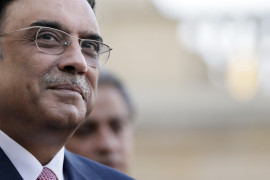
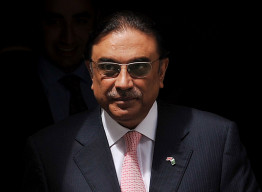
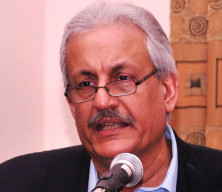
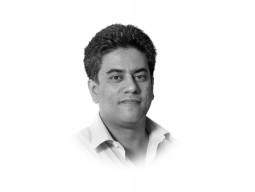

























ET EDITOR: MY COMMENT WAS TRANSMITTED ON 21-09-2013. PLEASE PRINT IT. AVM Shahzad Sahib..........please show some respect for the common person on the street. If "politics of the day" and "fortress mentality" carried our ex-President, then it was futile and transient. He is getting away by disgracing the law. The common person wants zero or little inflation, security, law in society, justice, water and power, jobs, no land mafias, among others. Politics of the day is fugacious and to be remembered as a good leader for all times, one must keep the COMMON PERSON on the street HAPPY and NOT COHORTS. PAKISTAN has lost five good years. No offense meant but next time please be selective in writing. Thanx and Salams
@tariq: "...all over the world political parties face such problem for short time as PPP is facing. So i think PPP also will revive soon...." . It is not a matter of occasional set backs that "happen" all over the world. Something else has been at play. Provinces have been drifting apart with their ethnic characters becoming more distinct over a long period of time. We cannot ignore the fate of IK, Overnight his one man party became a force to reckon with. Establishing contacts with the right crowd, the Pathan votes were snatched from the ANP/NAP along with defusing its claim of being a left-oriented party and delivered it to TTP/PTI combo, now sits comfortably at Religio-Ultra Right position. . Sindhi ethnic formations tried to ride the waves but their performance was very poor at the polls without making any dent in the rural appeal of PPP. Now the Sindhi rural party, though considerably reduced, will be forced to survive in it's natural habitat, only a miracle can bring them back to the national scene which was only a twist of fate.
may 11 election PPP performance was nt bad more than 1997 whn BB was alive So i totally disagree with this theory that BB's time PPP exists in all provinces.in all over the world political parties face such problem for short time as PPP is facing. So i think PPP also will revive soon. If some one can remember PML N situation in Musharaf regime was more worst.
@Abid P. Khan: Quite right.
@Junaid: "I agree with the Author, wholly. Sweeping changes need to be made within the party, the more intelligent governing PPP members need to have their hands unbound. " . The sweeping changes would be: A-Z will be acting as the promoter, financier, event manager, security-agent recruiter and a bit more, of Prince Billy. . On photo-ops, the Royal sisters would honour the occasion to charm fashion photographers and columnists, for providing them a chance once again to go into high gear. . If history is any witness, PPP would require another dead body to drag. Lyari District might help. . Interior Sindh is nailed for another hundred years. No worries there.
The saying that a dogs tail can not be straightened............is very true. The PPP in its present form suffers from many weaknesses but the biggest is that it is corrupt to the core and thus its capacity even to have a vision, is badly limited.
ZAB PPP existed in the 4 provinces. Benazir PPP existed in the 4 provinces. Zardari &Son & Daughter& so called Brother & Sisters PPP exist only in Sindh.
And still you think Zardari will resurrect from the ashes to form a PPP..
Well if you think this will happen than I will Blame none other then PML-N and the Prime Minister Nawaz Sharif Pakistan Tehrik Insaf who were incapable to wipe out PPP from Sindh also.
The present Administration failures will be the only cause of Zardari return to the helm of authority.
I agree with the Author, wholly. Sweeping changes need to be made within the party, the more intelligent governing PPP members need to have their hands unbound.
I totally disagree with the author, 'Asif Zardari is the only man who can rescue PPP'. Thanks to him, PPP is confined to Sindh only, winning zero seats from KPK and hardly any from Punjab.
Zardari is history now.
@Hasan: "All this talk is futile. Success of PPP is correlated to the number of feudals in their pocket." . Do you by any chance mean to say: Success of PPP is correlated to the number of feudals who have it in their pockets.
All this talk is futile. Success of PPP is correlated to the number of feudals in their pocket.